Book Nook Cafe discussion
Book Buddy !
>
Freedom From Fear- David M. Kennedy- January 2012
 chapter 21 page 762
chapter 21 page 762 An American Dilemma: The Negro Problem and Modern Democracy (Black and African-American Studies) Volume 1~~~Gunnar Myrdal
An American Dilemma: The Negro Problem and Modern Democracy (Black and African-American Studies) Volume 1~~~Gunnar MyrdalKennedy notes it became a best-seller. Unfortunately it is no longer in print. I guess people are too busy reading 50 Shades. :(
 chapter 21
chapter 21758-9
Here is more from Wiki on American Nisei. I didn't know that Senator Daniel Inouye was Nisei. Here is a link for more about him.
http://en.wikipedia.org/wiki/Daniel_I...
American Nisei
Main article: Japanese Americans
Some US Nisei were born during the Baby Boom after the end of World War II; but most Nisei who were living in the western United States during WWII were forcibly interned with their parents (Issei) and children (Sansei) after Executive Order 9066 was promulgated to exclude everyone of Japanese descent from large parts of the Western states. In some senses, the children of the Nisei seem to feel they are caught in a dilemma between their "quiet" Nisei parents and their other identity model of "verbal" Americans.[4] The Nisei of Hawaii had a somewhat different experience.
In the United States, two representative Nisei are Daniel Inouye and Fred Korematsu, but the individual life histories of all the Nisei are cumulatively creating a more complex tapestry than can be casually summarized. Hawaiian-born Daniel Ken Inouye (井上 建 Inoue Ken?) was one of many young Nisei men who volunteered to fight in the nation's military when restrictions against Japanese-American enlistment were removed in 1943. Fred Toyosaburo Korematsu (是松 豊三郎 Korematsu Toyosaburo ?) was one of many Japanese-American citizens living on the West Coast who resisted internment during World War II.
In 1944, Korematsu lost a U.S. Supreme Court challenge to the wartime internment of Japanese Americans but gained vindication decades later.[5] The Presidential Medal of Freedom, the highest civilian honor in the United States, was awarded to Korematsu in 1998. At the White House award ceremonies, President Clinton explained, "In the long history of our country's constant search for justice, some names of ordinary citizens stand for millions of souls. Plessy, Brown, Parks ... to that distinguished list, today we add the name of Fred Korematsu."[6]
The overwhelming majority of Japanese Americans had reacted to the internment by acquiescing to the government's order, hoping to prove their loyalty as Americans. To them, Korematsu's opposition was treacherous to both his country and his community. Across the span of decades, he was seen as a traitor, a test case, an embarrassment and, finally, a hero.
http://en.wikipedia.org/wiki/Nisei
 chapter 21
chapter 21page 763
Re: Pulman Porters.
I have this book on my TBR list.
 Rising from the Rails: Pullman Porters and the Making of the Black Middle Class~~~Larry Tye
Rising from the Rails: Pullman Porters and the Making of the Black Middle Class~~~Larry TyeWhen George Pullman began recruiting Southern blacks as porters in his luxurious new sleeping cars, the former slaves suffering under Jim Crow laws found his offer of a steady job and worldly experience irresistable. They quickly signed up to serve as maid, waiter, concierge, nanny, and occasionally doctor and undertaker to cars full of white passengers, making the Pullman Company the largest employer of African Americans in the country by the 1920s.
Drawing on extensive interviews with dozens of porters and their descendants, Larry Tye reconstructs the complicated world of the Pullman porter and the vital cultural, political, and economic roles they played as forerunners of the modern black middle class. Rising from the Rails provides a lively and enlightening look at this important social phenomenon.
 chapter 21
chapter 21Page 770
Believe it or not, I first recall hearing about the "Zoot Suit Riots" on the TV comedy show The Big Bang Theory. :)Maybe if I had Sheldon as a teacher more history would have stuck in my brain. :)
http://en.wikipedia.org/wiki/Zoot_Sui...
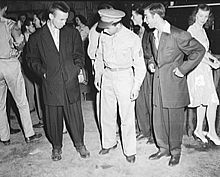
 chapter 21
chapter 21p 771
Here is a youtube of Frank Capra's film, The Negro Soldier.
http://www.youtube.com/watch?v=XRUeOO...
Wiki link for the movie:
http://en.wikipedia.org/wiki/The_Negr...
It's so amazing that one can view these old army films. Youtube is really terrific.
 I was curious as to the origin of the words "Jim Crow".
I was curious as to the origin of the words "Jim Crow".wiki
Etymology
The phrase "Jim Crow Law" first appeared in 1904 according to the Dictionary of American English,[2] although there is some evidence of earlier usage.[3][4] The origin of the phrase "Jim Crow" has often been attributed to "Jump Jim Crow", a song-and-dance caricature of blacks performed by white actor Thomas D. Rice in blackface, which first surfaced in 1832 and was used to satirize Andrew Jackson's populist policies. As a result of Rice's fame, "Jim Crow" had become a pejorative expression meaning "Negro" by 1838 and when the laws of racial segregation – directed against blacks – were enacted at the end of the 19th century they became known as Jim Crow law
http://en.wikipedia.org/wiki/Jim_Crow...
 chapter 21
chapter 21page 786
I had to look up this whole sentence ! I'll save you the time. :)
"Frederick Jackson Turner's fin-de-siecle threnody..."
Fin-de-siecle: French-- Turn of the century
Threnody-- speech
Frederick Jackson Turner-- 1861-1932 American historian
Wiki:
http://en.wikipedia.org/wiki/Frederic...
 chapter 21
chapter 21p 788
I love Walter Winchell's phrase for the House of Representatives....House of Reprehensibles.
wiki for Winchell
http://en.wikipedia.org/wiki/Walter_W...
 The warmth of other suns talks about many of the same things this chapter mentions. Northern employers shunning blacks, lack of enough housing, racial riots. Blacks left the south to get away from jim crow but there was racial tension everywhere.
The warmth of other suns talks about many of the same things this chapter mentions. Northern employers shunning blacks, lack of enough housing, racial riots. Blacks left the south to get away from jim crow but there was racial tension everywhere.
 Alias Reader wrote: "chapter 21
Alias Reader wrote: "chapter 21page 763
Re: Pulman Porters.
I have this book on my TBR list.
[bookcover:Rising from the Rails: Pullman Porters and the Making of the Black Middle Class]Rising from the Rails: Pullman..."
One of the three people in Warmth of other Suns was a porter on the railroad. I don't remember who he worked for. He did well but still felt like he was being held back from what he could be. I think I might add the book you mention to my list to read as well.
 Julie wrote: "The warmth of other suns talks about many of the same things this chapter mentions. Northern employers shunning blacks, lack of enough housing, racial riots. Blacks left the south to get away from ..."
Julie wrote: "The warmth of other suns talks about many of the same things this chapter mentions. Northern employers shunning blacks, lack of enough housing, racial riots. Blacks left the south to get away from ..."--------
The discussion this book engendered on another gr board (I think it was CR )prompted me to buy it.
 Julie wrote: "I was going to read it with CR. I was only a half a year behind or something :-)"
Julie wrote: "I was going to read it with CR. I was only a half a year behind or something :-)"-----------
I hear ya. Sometimes I feel like Sisyphus in the Greek myth when it comes to my TBR Mountain. :)
I simply can't get ahead of the avalanche of books I want to read.
 GR link for book mentioned on page 813 Chapter 22
GR link for book mentioned on page 813 Chapter 22I've heard of the book, but didn't know the subject matter.
The Naked and the Dead~~Norman Mailer
Hailed as one of the finest novels to come out of the Second World War, The Naked and the Dead received unprecedented critical acclaim upon its publication and has since become part of the American canon. This fiftieth anniversary edition features a new introduction created especially for the occasion by Norman Mailer.
Written in gritty, journalistic detail, the story follows an army platoon of foot soldiers who are fighting for the possession of the Japanese-held island of Anopopei. Composed in 1948, The Naked and the Dead is representative of the best in twentieth-century American writing
 Alias Reader wrote: "Chapter 21
Alias Reader wrote: "Chapter 21page 746
I don't think I knew that 4 bombs were dropped on Oregon during WWII. Did you ?
Here is a good article and a picture of the plan.
http://www.eugeneleeslover.com/Japane......"
When we lived in Oregon the paper shared the news, which was new to me. However, what they mentioned was different from what you shared, Alias. We read that the bombings/balloons, similar to hot-air balloons, somehow floated from the subs, not that there were planes aboard. This makes more sense, to me, as i wondered how they could target forests that way. Luck seemed vital without planes. Now i know better.
deb
 Alias Reader wrote: "chapter 21
Alias Reader wrote: "chapter 21Page 770
Believe it or not, I first recall hearing about the "Zoot Suit Riots" on the TV comedy show The Big Bang Theory. :)Maybe if I had Sheldon as a teacher more history would have ..."
My dad happened to be in California the night of the first Zoot Suit Riot. It was their first leave there & they were awed by those suits. And, whether this is memory or read-history remembered, i won't say, he felt the tension of the night. The next day they learned of the riots & felt relieved to have missed them. Future leave was cancelled, no doubt a harbor for future grudges.
Our family likes this song, despite the topic, probably partly because it was filmed in Eugene, OR, where the band originated. Unfortunately the band is called Cherry Poppin' Daddies, which i disdain. But the music...
http://www.youtube.com/watch?v=1IqH3u...
 Thanks for sharing the youtube of Zoot Suit Riot song. I've never heard of the group or song before. Though I am not sure the song fits the serious of the event. Good tune though.
Thanks for sharing the youtube of Zoot Suit Riot song. I've never heard of the group or song before. Though I am not sure the song fits the serious of the event. Good tune though. That must have been pretty scary for your dad. Good thing he didn't wander into trouble accidentally.
 I agree about the song vs. the riots. The idea of the suits & what they meant is probably what the songwriters hoped to express but it's awfully light.
I agree about the song vs. the riots. The idea of the suits & what they meant is probably what the songwriters hoped to express but it's awfully light.
 June 18
June 18It was on this date in 1940 that Winston Churchill gave his famous "finest hour" speech. He had only been prime minister for about a month. Nazi Germany had conquered Holland, Belgium, and Luxembourg, and had taken Paris. France had just asked Germany for an armistice agreement, and now Britain stood alone against Hitler and his war machine. Churchill addressed the House of Commons just before four p.m. and talked for about 40 minutes.
His speech concludes: "Hitler knows that he will have to break us in this Island or lose the war. If we can stand up to him, all Europe may be free and the life of the world may move forward into broad, sunlit uplands. But if we fail, then the whole world, including the United States, including all that we have known and cared for, will sink into the abyss of a new Dark Age made more sinister, and perhaps more protracted, by the lights of perverted science. Let us therefore brace ourselves to our duties, and so bear ourselves that if the British Empire and its Commonwealth last for a thousand years, men will still say, 'This was their finest hour.'"
***The Writer's Almanac is produced by Prairie Home Productions and presented by American Public Media.
The Gathering Storm~Winston S. Churchill
 Upthread those of you reading the book discussed the fact that the UK had to recover from the economy, as well as the war itself. I think the above speech helped for years after the war, so inspirational were Churchill's words. Superb orators can carry us beyond the immediate effects and he has proven himself one.
Upthread those of you reading the book discussed the fact that the UK had to recover from the economy, as well as the war itself. I think the above speech helped for years after the war, so inspirational were Churchill's words. Superb orators can carry us beyond the immediate effects and he has proven himself one.deb
 Madrano wrote: . Superb orators can carry us beyond the immediate effects and he has proven himself one.
Madrano wrote: . Superb orators can carry us beyond the immediate effects and he has proven himself one.-----------
He certainly was.

message # 317: by Madrano
Jun 17, 2012 12:48pm
================================
Alias Reader wrote: "Chapter 21
page 746
I don't think I knew that 4 bombs were dropped on Oregon during WWII. Did you ?
Here is a good article and a picture of the plan.
http://www.eugeneleeslover.com/Japane......"
====================
Deb replied.
When we lived in Oregon the paper shared the news, which was new to me. However, what they mentioned was different from what you shared, Alias. We read that the bombings/balloons, similar to hot-air balloons, somehow floated from the subs, not that there were planes aboard. This makes more sense, to me, as i wondered how they could target forests that way. Luck seemed vital without planes. Now i know better.
==========================
Deb, you weren't incorrect. It was another incident that Kennedy talks about for 2 pages.
Chapter 22
pages 848-9
Unfortunately it is too long for me to type out. But in part it says:
Japanese technicians had begun in November 1944 to loft high-altitude balloons designed to carry small incendiary bombs across the broad Pacific and drop them on the western U.S. Japanese schoolgirls assembled the balloons...Ninety-three hundred Japanese balloons were drifting mutely eastward in the jet steam's embrace. Those that made it across the Pacific dropped their fiery loads to earth all across North America, from the Yukon Territory to Baja California, though most landed in the north-western corer of the U.S,. Some alarmed American officials worried that the balloons might be instruments of germ warfare. They ignited some minor forest fires, many of them promptly extinguished by the "triple Nickels." the 555th Negro Parachute Infantry Battalion, consigned to duty as smoke jumpers. A voluntary American news blackout denied the Japanese any confirmation that the balloons had actually completed their journey. As Japan's hydrogen stocks dwindled, the last balloons were launched in April 1945.
A month later, on May 5, the Reverend Archie Mitchell and his wife, Else, were leading a Sunday school outing in the woods near Bly, Oregon. While Reverend Mitchell was moving his car, Mrs. Mitchell and five children tugged at a strange object they had fond in the underbrush. The balloon bomb exploded, killing her and all the children. The six victims were the only mainland American casualties of the war.
*this information the author cited from the book
 Japan's World War II Balloon Bomb Attacks on North America~Robert C. Mikesh
Japan's World War II Balloon Bomb Attacks on North America~Robert C. Mikesh
 chapter 22
chapter 22 page 813
I found this an interesting stat.
"90% of American prisoners of war in the Pacific reported being beaten. More than a third died.Those who survived spent 38 months in captivity on average and lost 61 pounds."
After reading Unbroken: A World War II Story of Survival, Resilience and Redemptionthis didn't surprise me. However, this part did.
"In Europe, by contrast, the average American POW spent 10 months in captivity and lost 38 pounds. Virtually all the Americans who fell in German hands -99%- survived"
 Chapter 22
Chapter 22 page 817
OMG! The story of what happened at Marpi Point at Saipan when thousand of Japanese civilians, mostly women an children hurled themselves off a cliff rather than be by Americans is horrifying.
There is a History channel Youtube video you can see if you google Marpi point Saipan. It's disturbing to watch, so I wont provide a link.
 Chapter 22
Chapter 22page 822
Here is a terrific youtube of
General Mcarthur: "People of the Philippines, I have returned"
http://www.youtube.com/watch?v=Wv1PF0...
 Chapter 22
Chapter 22p827
Interesting factoid.
Kamikaze means "divine wind" a reference to the typhoon that scattered Kublai Khan's invasion fleet headed for Japan in the 13th century.
 Chapter 22
Chapter 22p829
RE: Navaho Code Talkers
There are some interesting books on this. Here are just two that seem popular on Amazon.
 Code Talker: The First and Only Memoir By One of the Original Navajo Code Talkers of WWII~~Chester Nez
Code Talker: The First and Only Memoir By One of the Original Navajo Code Talkers of WWII~~Chester Nez The Navajo Code Talkers~~Doris Atkinson Paul
The Navajo Code Talkers~~Doris Atkinson Paul
 Chapter 22
Chapter 22page 830
The Associated Press photographer Joe Rosenthal climbed up on some rocks and snapped a photograph of the Suribachi flag raising that was destined to become on of the most famous images of the war and the inspiration for the Marine Corps monument near Arlington National Cemetery.
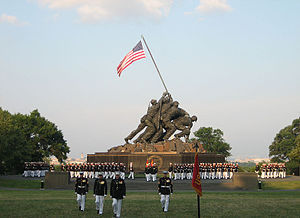
 Chapter 22
Chapter 22page 834
These last few battles stagger the mind. I can't really grasp just carnage and death. And yet, the Japanese were willing to fight to the last man, women or child.
"Okinawa - 7000 Japanese survived out of the original 77,000. The fighting killed over 100,000 Okinawan civilians."
 chapter 22
chapter 22page 835 onward.
The way Kennedy describes the lack of debate over the bomb and the buildup to its use is some amazing reading.
"For perhaps 10 minutes, the proposition was the subject of general discussion." p840
"The decision to use the bomb might better be described as a series of decisions not to disturb the momentum of a process that was more than three years old by the spring of 1945 and was rapidly building toward its all but inevitable climax." p840
"The moral rules that had once stayed men's hands from taking up weapons of mass destruction against noncombatants had long since been violently breached in WWII, first in the aerial attacks on European cities, and than even more wantonly in the systematic firebombing of Japan." p845
Some great turns of phrase by Kennedy describing the atom bomb.
"History had its own momentum and it tolerated no delay."
"To a degree that later generations would find remarkable, the advent of the nuclear age was heralded by little fanfare and even less formal deliberation. events were in the saddle, and they rode men hard."
 Chapter 22
Chapter 22page 838
"In the midst of the Potsdam Conference, Churchill received word that the British elections had turned him out of office. On July 28 Clement Atlee took the British prime minister's seat at the conference table."
I wish Kennedy had explained this in greater detail. I know the British were war weary, but still ....Churchill !
 Epilogue 852- end
Epilogue 852- endJapanese Instrument of Surrender
The Japanese Instrument of Surrender was the written agreement that enabled the Surrender of Japan, marking the end of World War II.
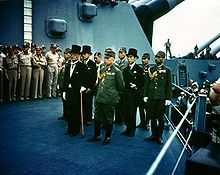
Representatives of Japan stand aboard the USS Missouri prior to signing of the Instrument of Surrender.
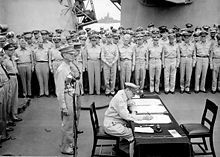
General of the Army Douglas MacArthur signing the Instrument of Surrender on behalf of the Allied Powers
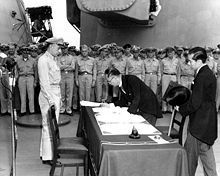
Japanese Foreign Minister Mamoru Shigemitsu signing the Instrument of Surrender on behalf of the Japanese Government, formally ending World War II
http://en.wikipedia.org/wiki/Japanese...
 Epilogue
Epiloguep856
"In the mysterious zone where history mixes with memory to breed national myths,..."
I finished !! What can I say? This will rank as one of the best books I've ever read. I owe a big Thank You, to you, Julie, for taking this big project on with me and sticking with it. You are the BEST !
I look forward to your comments when you finish.
 Japanese technicians had begun in November 1944 to loft high-altitude balloons designed to carry small incendiary bombs across the broad Pacific and drop them on the western U.S. Japanese schoolgirls assembled the balloons...."
Japanese technicians had begun in November 1944 to loft high-altitude balloons designed to carry small incendiary bombs across the broad Pacific and drop them on the western U.S. Japanese schoolgirls assembled the balloons...."Thank you, Alias. This explains it all to me.
Congratulations on completing the book. Both you & Julie have been consistent in reading & sharing, while i've just sat back and amassed info.
The story of the civilians at Marpi Point at Saipan is stunning. I cannot imagine what could lead people to do this. I'm sure mass hysteria played a part.
The Code-Talkers were well known in the Native American community, even those from other tribes were proud that natives contributed in this way to the war. Surviving members gave speeches on various reservations during the 80s & 90s. You might imagine how well attended those were. The men told their stories but also used the opportunity encourage continued education in tribal languages across the country. Great example of why, one must say.
deb
deb
 Madrano wrote: Congratulations on completing the book. Both you & Julie have been consistent in reading & sharing, while i've just sat back and amassed info.
Madrano wrote: Congratulations on completing the book. Both you & Julie have been consistent in reading & sharing, while i've just sat back and amassed info.------------
Thanks, Deb. I am glad we took our time reading this. It gave me the time for more thoughtful reading.
I liked sharing the book with you and enjoyed reading your posts about it.
 Yay you are finished! That was a big project wasn't it? Well worth it though. I still have 20 pages of ch 21 left plus 22 and the epilogue. I really want to get done before the end of the month because I have a full reading schedule for July. I need to finish my current fiction book in order to start suite francaise too. Right now I am sitting on my MILs couch wanting to go home to read.
Yay you are finished! That was a big project wasn't it? Well worth it though. I still have 20 pages of ch 21 left plus 22 and the epilogue. I really want to get done before the end of the month because I have a full reading schedule for July. I need to finish my current fiction book in order to start suite francaise too. Right now I am sitting on my MILs couch wanting to go home to read.
 Since this book was about the Great Depression and WWII, I thought this story would be of interest.
Since this book was about the Great Depression and WWII, I thought this story would be of interest.World War II Veteran John Joseph Keker Is Reunited With Long-Lost Dog Tag Thanks To Australian Soldier
More than 67 years later, a World War II veteran has been reunited with his lost dog tag thanks to the efforts of an Australian soldier.
Marine Corps veteran John Joseph Keker, who was just 17 when he was first deployed, told Green Valley News that he lost his dog tag when he was stationed at Guadalcanal in the Solomon Islands in the early 1940s.
Keker, who is now 88 and lives in Green Valley, Ariz., said he doesn't remember how he lost the dog tag but that he never expected to see it again.
"I haven't any idea when or where I lost it," he told The Huffington Post. "It could've been anywhere."
So when Shane Fender, a reservist with the Australian army, called him a few months ago claiming to have found his long-lost dog tag, Keker admits that he was initially skeptical.
"It didn't sink in at first. I thought, "Who's Shane?" -- I didn't know what he was talking about," Keker said.
Fender, 40, explained to Keker that he had stumbled upon a box of dog tags while deployed in the Solomon Islands last year.
Determined to find the owners of the dozen or so dog tags that he had found, Fender said he scoured the Internet for more information using the men's names and military details.
According to Green Valley News, Fender, who lives in a suburb of Sydney, Australia, said he finally got in touch with the Marine Raider Association who was able to put him in contact with Keker.
“It dawned on me that those tags needed to get home rather than rust away in a box,” Fender, whose great-uncle fought in World War I, wrote in a letter to Keker. “If someone had sent me a personal item from my relatives from either World War I or World War II, I could not explain what it would mean to me or how special it would be.”
Fender, who mailed the letter along with the dog tag to Keker, has also managed to connect with the relative of a deceased Marine in Illinois. He said he is still looking for the owners of the other dog tags.
Keker said he was very moved by the soldier's gesture.
"I broke down a little bit. People don't do much for me so when someone goes out of his way, I really appreciate that," he told The Huffington Post. "Shane -- I thought he was the greatest guy. I can't thank him enough."
Keker added that receiving the dog tag brought back memories of the war -- particularly of the friends he made during that challenging time.
"Everybody was so dependent on one another [during the war]. It was a hard time. They were like family and I miss them. They are what I remember most," he said.
http://www.huffingtonpost.com/2012/06...
 Alias Reader wrote: "Fender, 40, explained to Keker that he had stumbled upon a box of dog tags while deployed in the Solomon Islands last year...."
Alias Reader wrote: "Fender, 40, explained to Keker that he had stumbled upon a box of dog tags while deployed in the Solomon Islands last year...."Good for him! I hope he has much luck in this project, as i know it will be meaningful to the original owners.
 Alias Reader wrote: "Japanese technicians had begun in November 1944 to loft high-altitude balloons designed to carry small incendiary bombs across the broad Pacific and drop them on the western U.S. Japanese schoolgirls assembled the balloons...Ninety-three hundred Japanese balloons were drifting mutely eastward in the jet steam's embrace...."
Alias Reader wrote: "Japanese technicians had begun in November 1944 to loft high-altitude balloons designed to carry small incendiary bombs across the broad Pacific and drop them on the western U.S. Japanese schoolgirls assembled the balloons...Ninety-three hundred Japanese balloons were drifting mutely eastward in the jet steam's embrace...."This was kind of amusing. It sounds so low-tech! Interesting that kids made them too.
 Alias Reader wrote: "Chapter 22
Alias Reader wrote: "Chapter 22 page 817
OMG! The story of what happened at Marpi Point at Saipan when thousand of Japanese civilians, mostly women an children hurled themselves off a cliff rather than be by America..."
Made me think of the world trade center when people jumped out the windows....
 Alias Reader wrote: "Chapter 22
Alias Reader wrote: "Chapter 22page 830
The Associated Press photographer Joe Rosenthal climbed up on some rocks and snapped a photograph of the Suribachi flag raising that was destined to become on of the most famo..."
You know I've seen photos of this statue before but I never really knew what it was!
 Alias Reader wrote: "Chapter 22
Alias Reader wrote: "Chapter 22page 834
These last few battles stagger the mind. I can't really grasp just carnage and death. And yet, the Japanese were willing to fight to the last man, women or child.
"Okinawa..."
Amazing isn't it? They were determined! I am almost surprised there was anyone left in the country by the time the whole war was over after that and after what we did to them with the fire bombs and atomic bombs.
 Alias Reader wrote: "Chapter 22
Alias Reader wrote: "Chapter 22page 817
OMG! The story of what happened at Marpi Point at Saipan when thousand of Japanese civilians, mostly women an children hurled themselves off a cliff rather than be by America..."
=====================
Julie wrote:Made me think of the world trade center when people jumped out the windows..."
=============
Except in the Saipan case the danger was made up. They feared the Americans due to the propaganda they were fed. So sad.
Books mentioned in this topic
Grand Expectations: The United States, 1945-1974 (other topics)Code Talker: The First and Only Memoir By One of the Original Navajo Code Talkers of WWII (other topics)
The Navajo Code Talkers (other topics)
Unbroken: A World War II Story of Survival, Resilience and Redemption (other topics)
Japan's World War II Balloon Bomb Attacks on North America (other topics)
More...
Authors mentioned in this topic
James T. Patterson (other topics)Chester Nez (other topics)
Doris Atkinson Paul (other topics)
Robert C. Mikesh (other topics)
Winston S. Churchill (other topics)
More...


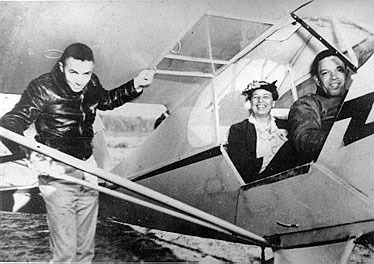


page 761
Paul Robeson singing Ballad for Americans on YouTube
http://www.youtube.com/watch?v=rnXyGr...